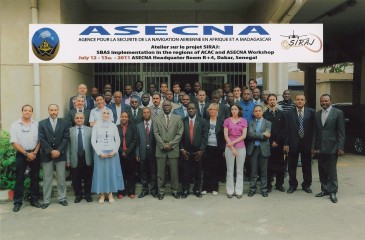Europe started its activities in the field of Satellite Navigation with the design and implementation of EGNOS, the European Geostationary Overlay Service. Conceived for the Civil Aviation needs and now providing operational services in Europe, EGNOS has interesting perspectives of commercial utilization also in other markets, as a precursor of Galileo. EGNOS is a Satellite-Based Augmentation System (SBAS) with a regional coverage, interoperable with equivalent regional systems in the USA, Japan, India and Russia. One of the key features of EGNOS is that service coverage could be extended to areas adjacent to the current European service area through deployment of ground infrastructure, thus sharing the existing space segment of the European system.
Indeed the capacity to provide operational services above the African territories has already been technically explored years ago. However the intense activity deployed during the two last years under the leadership of the European Commission (DG Enterprise and Industry -Unit GP3 – EU Satellite Navigation Programs ) has resulted in concrete outcomes. Extending EGNOS over the whole African continent is among the priorities envisaged by the European Commission*.This initiative is now included in the Second Action Plan of the Africa-EU Strategic Partnership adopted at the Africa-EU Summit in November 2010 which provides a solid programmatic basis for the implementation of the Preliminary Phase of EGNOS-Africa.
Consistently with this strategy the European Commission Services have taken initiatives to have appropriate level of support and expertise for the implementation of this activity. The SUCCESS Contract results from a Call for Tender with the aim to provide support in the area of International matters with an emphasis on Africa. Daniel Ludwig Consultant (DLC) is one of the four main partners of this Contract.
The first Africa-EU management meeting on EGNOS and Africa was held in Brussels on 14-15 April 2011. One objective of the meeting co-chaired by Michel Bosco for the European Commission and the African Union Commission ,was to discuss the organization of the work, and involved the organizations that could take part in the development and service provision of SBAS in Africa. This meeting was followed by intense discussions between the EC and representatives of South Africa in the Context of the Space dialogue held in Pretoria on 18-19 April 2011.
Moreover the SIRAJ Project (SBAS implementation in the regions of ACAC and ASECNA),coordinated by Pildo, has been founded under FP7 call .SIRAJ aims at performing concrete actions in support of potential extension of EGNOS services and safety critical operations in the areas covered by the Arab Civil Aviation Commission (ACAC) and the Agence pour la Sécurité de la Navigation Aérienne en Afrique et à Madagascar (ASECNA). The first SIRAJ workshop. took place on 12-13 July 2011, at ASECNA premises in Dakar, while the second one is now planned on 28 May at the seat of the Arab Civil Aviation Commission (ACAC) in Rabat, Morocco.
A bilateral meeting was organized between the European Commission ,represented by Stefano Scarda ,and ASECNA (Agence pour la Securité de la Navigation Aerienne en Afrique et à Madagascar) representatives in July. The meeting has confirmed the willingness of ASECNA to play a key role in the implementation of the activity as expressed by Mr Amadou Guitteye, Director General of this pan African Organisation (17 States covering about 1.5 Europe ).
A follow up meeting was then organized in Toulouse in ENAC( Ecole Nationale de l’Aviation Civile)on 6 and 7 December 2011 with Participants from the European Commission, ESA,CNES on the European side and key representatives of ASECNA hierarchy (Mme Josette Claire Edou Obame – Directeur de l’Exploitation Technique, MM Wodiaba Samake- Chef de Département Navigation Aérienne ,Roland Kameni Doudie -Departement ingénierie Prospective ,Julien Lapie – Conseiller du Directeur Général ).The meeting provided important contributions to the choice of the technical solutions able to provide adequate services and was the opportunity to structure and plan the work needed during the year 2012.It confirmed if needed the interest of providing operational GNSS services in Africa.
Based on this solid background excellent perspectives can be expected during this year. The initiative of the European Commission DG DEVCO to launch concrete actions through call for tenders is already noticeable as well as the intention of both ASECNA and South Africa to contribute to the Detailed Definition of the system.
*[COM(2009) 301 “Partnership between the European Union and Africa – Connecting Africa and Europe: working towards strengthening transport cooperation”, Brussels, 24.6.2009]


